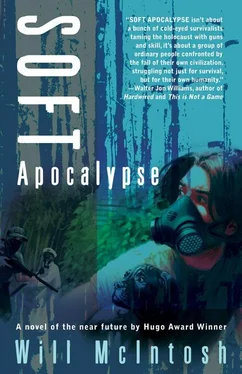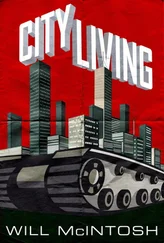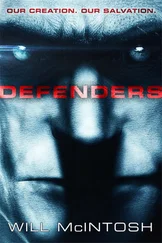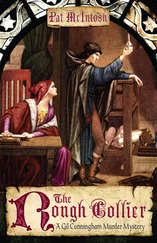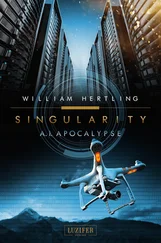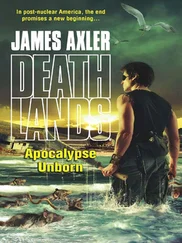“I’m coming,” Deirdre said. “Fuck you,” she added before hanging up.
We jogged as fast as Jeannie could, through a roiling tide of people fleeing in every direction, past looters climbing into shattered store windows, past tanks rumbling down Habersham Street. Eventually we stopped running and hugged the edge of doorways, trying not to be noticed. We cut through an alley and had to step over three bodies, probably dragged from a car that was bent around a telephone pole. One had been shot in the eye, an old black woman.
There was a long burst of gunfire nearby.
“Oh jeez,” Colin said. A block away, on Lincoln Street, men with automatic weapons were executing dozens of people kneeling, hands behind their heads, in front of an apartment building.
We turned into another alley, behind Liberty, and ran headlong into four soldiers in MOP suits and gas masks. Federal government soldiers. The cavalry had arrived. With the president dead, I wondered who they were taking orders from. The VP? The secretary of defense?
“Let’s go,” one of them said, motioning with a gun “you’re being evacuated.
“Evacuated where?” Ange asked.
“Move,” the soldier said.
We were taken a block over and directed into a section of Bull Street that had been barricaded with cyclone fencing topped with spirals of silver barbed wire. There were thousands of people milling around inside the fence.
We sat on the edge of the sidewalk, in the shade.
“I’m going to go up front and see what’s happening,” Colin said. “Stay here.”
People were standing quietly, in bunches. “We’ll be safe soon,” someone said nearby. A mother was stroking her crying child’s hair. She lurched forward suddenly and vomited into the sewer grate between her feet. The people nearest scurried away, giving her a wide buffer. The woman barely noticed; she was staring between the rusted iron bars of the sewer, into the wet darkness below.
Colin came back at a trot. “I don’t like this. They’re separating people into groups—old people in one, one for younger men, another for younger women, a fourth for anyone who doesn’t speak English.”
“Why would they do that?” I asked. My pounding heart made me think that the answer was something awful, and that maybe deep down I knew what it was.
“None of the answers that make sense are good things,”Ange said. We had to get out.
We walked the perimeter, trying not to raise suspicion, looking for a way out. Up the street in Forsyth Park, three big semis were pulling out, one after the other to form a convoy.
“I think there are people in there,” I said. “I think the young males are being conscripted into the Army.”
The holding pen we were in was thinning as people were sorted into categories and disappeared through a gate at the front, near the park. Soon we’d be corralled toward the front, and then Colin and I would be separated from Ange and Jeannie.
We finished our walk back near the woman who’d vomited. She hadn’t moved; her head was still hanging over the sewer.
The sewer.
I retrieved a mangled bicycle handlebar from a trash heap. “Guys, stand so you’re blocking me from the soldiers’ view.” I pried open the manhole in the center of the street. “Come on.” I climbed down the slimy rungs of a ladder. Ange was right behind me, her red sneakers in front of my nose.
We waded down the main sewer tunnel through ankle-deep effluence. A dozen others had followed us, but they were lagging behind and keeping to themselves.
Striped sunlight filtered through sewer grates intermittently. Far ahead was a brighter area; harsh engine noises echoed down the pipe from there.
I turned right, into a smaller pipe where we had to bend at the waist.
“Do you know where you’re going?” Ange asked.
“No idea,” I said. “I just want to put some distance between us and those soldiers.”
“You think we can we take this all the way to Thirty-eighth?” Jeannie asked.
That was a great idea. If there was another juncture I could turn left and follow Drayton six blocks to Thirty-eighth.
We found the juncture and turned left. The tunnel ahead seemed to be partially blocked. As we drew closer, we could see that it was blocked by a pile of bodies. We pressed along the damp concrete wall as we went around the pile. There were a dozen or so bodies heaped in a twisted tangle. They looked to be Civil Defense. Above them, light filtered in along the edges of a steel grate.
“The federal soldiers must have killed them,” Ange said.
“Help me,” a face buried in the pile whispered. A woman, strands of her hair spilling over a booted foot. Her mouth was caked in white foam and blood. One of her arms jutted from under the leg of a hairy man. Her hand opened.
Jeannie grasped it, staring at the pile of bodies on top of the woman.
“I’m sorry, we can’t,” she said. She squeezed the woman’s hand. We hurried on, the woman’s pleas fading in the distance.
I counted six blocks, then climbed a ladder and strained to unseat the manhole cover. The first thing that came into view was a street sign: Thirty-eighth.
We crossed Thirty-eighth and hit the tracks, scurrying like roaches fleeing the bathroom light. The tracks cut through back yards and vacant lots. As we reached each intersecting street we sprinted across. Sebastian had chosen well—there wasn’t much going on around the tracks. We passed an abandoned loading dock surrounded by heaps of rusting kitchen appliances. Families were ducked down among them, hiding.
“Are there other people we should call and offer to let them come with us?” I asked. Most of our friends had their own families, their own housemates.
“Cortez?” Colin said.
Cortez. I hadn’t seen him in six months, since the night of the killing.
“He’s big and tough, and we can trust him,” Colin said.
“Yeah,” I said. I called Cortez.
He was way ahead of us, already on I-16. He’d traveled the last thirty blocks out of the city in a sewer. He agreed to swing back and meet us on the tracks outside the city.
“Good call,” I said to Colin as I hung up. I’d felt a rush of affection when I heard Cortez’s voice. Yeah, it would be good to have him with us.
We walked on, watching for Sebastian, gravel crunching underfoot.
“We should call Sophia,” Jeannie said. The name jolted me; it must have registered on my face. “She was good to us when we needed help, we should see if she needs our help now.”
Colin looked at me and shrugged. “Do you remember her number?”
Of course I remembered her number. I took a deep breath and punched it in, put the phone to my ear, listened to the ring as if it were the cry of some mythical beast.
“Hello?” That unmistakable island lilt.
“Sophia, it’s Jasper.”
Pause. “How’re you? It’s been a long time.”
“Alive,” I said. “Are you all right? We’re leaving the city. We wanted to see if you needed help.”
She said they were barricaded in their condo in one of the gated communities. Their police force was in a pitched battle, trying to repel gangs storming the walls.
They were barricaded. Hopes I hadn’t even felt welling up were dashed. And now that I was conscious of them, I felt like a sick bastard for hoping that her husband had left her, or died.
I filled the others in.
“They’ve got to get out of there,” Ange said. “Sooner or later the mob will get in, and they’ll kill everyone.”
“There’s no way out!” Sophia said, her voice hitching. She’d heard Ange.
We’d used the sewers, and so had Cortez. The gated communities must use the same sewers as the rest of the city, if nothing else. “I think I know a way. I’m going to have Cortez call you and guide you out. You remember Cortez?”
Читать дальше
